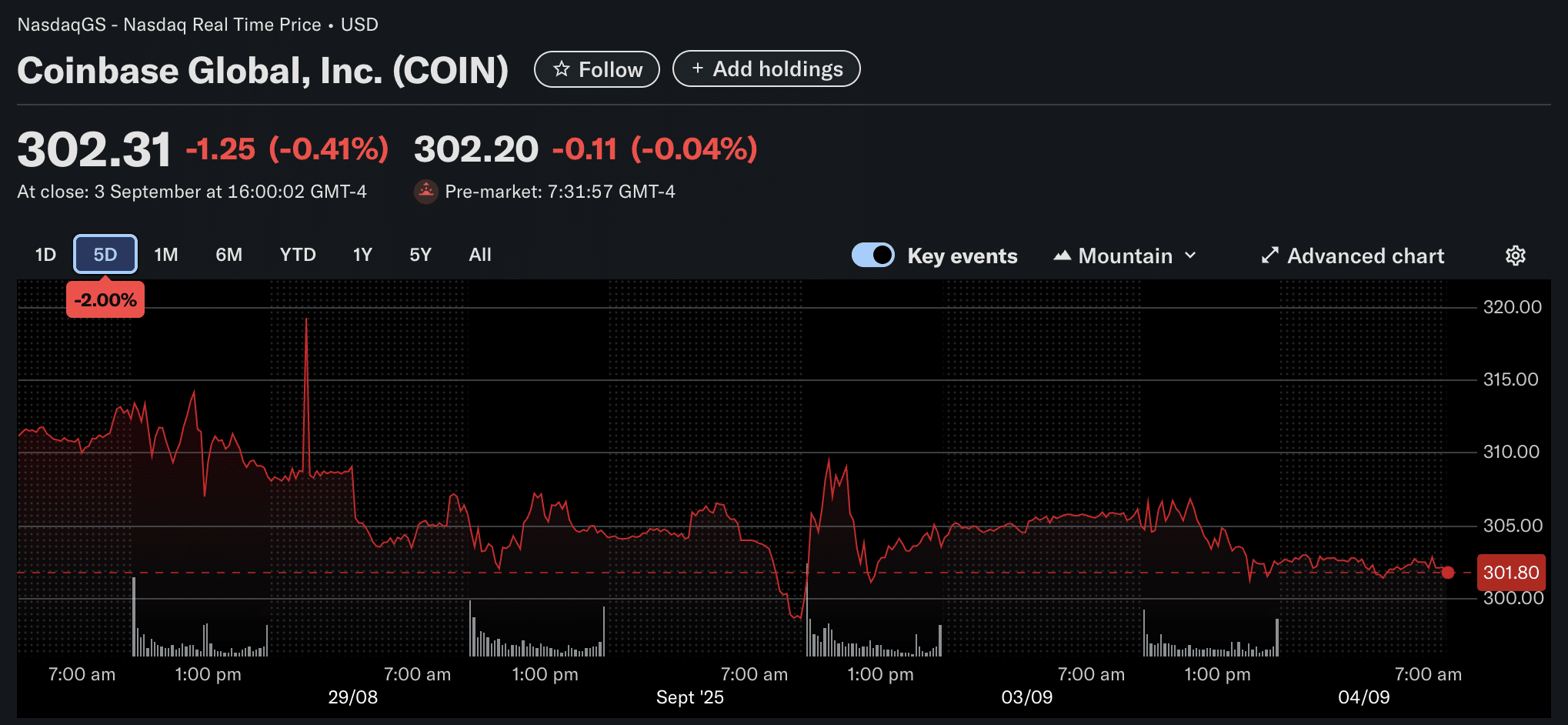Coinbase CEO Brian Armstrong Reveals 40% of Daily Code is Now AI-Generated as COIN Stock Tumbles
Coinbase's AI revolution hits coding milestone—but Wall Street remains skeptical.
The Code Transformation
Brian Armstrong drops bombshell: artificial intelligence now writes 40% of daily code output at America's crypto exchange giant. Engineers shift from creators to curators as machine learning algorithms handle heavy lifting.
Market Backlash
COIN stock immediately tanks on the announcement—because nothing says 'stable growth' like replacing your dev team with neural networks. Traders clearly more impressed by human-generated profits than AI-generated pull requests.
Silicon Valley's New Normal
Coinbase joins tech's automation arms race, betting big on AI efficiency gains. The move signals broader industry shift where code quality meets algorithmic quantity.
Wall Street's verdict? They'd prefer 40% revenue growth instead.
Brian Armstrong Proudly States 40% Of Coinbase Code Is Written By AI: Wants To Increase To 50%
The Coinbase CEO posted yesterday (September 3), stating, “~40% of daily code written at Coinbase is AI-generated. I want to get it to >50% by October. Obviously, it needs to be reviewed and understood, and not all business areas can use AI-generated code. But we should be using it responsibly as much as we possibly can.”
Armstrong has been vocal in advocating for the expansion of AI’s role within the company. In a podcast last month, he admitted to firing programmers who were resistant to using AI coding tools. He later acknowledged that this action was “heavy-handed” and unpopular among some staff members.
Armstrong’s efforts align with Coinbase’s internal initiatives and reflect a broader trend in the industry. According to OpsLevel, a company that develops internal development portals, by June 2025, 94% of tech companies had employees utilizing AI coding assistants. The primary benefits cited for this shift are increased productivity and faster time to market.
AI-assisted coding typically involves developers using AI for rapid code generation while still debugging, reviewing, and maintaining an understanding of the processes undertaken by the AI.
Coinbase CEO’s Stance On AI For Coding Comes Amid The Rise Of “Vibe Coding”
Watched @karpathy's (excellent) talk on "vibe coding", and I've never felt more vindicated in my life. pic.twitter.com/FGFAslcIA7
— Martian Potato (@rad_hardened) July 6, 2025
The concept of “vibe coding” has gained popularity this year, thanks in part to computer scientist Andrej Karpathy, who is the former senior AI director at Tesla and the founder of Eureka Labs.
In his explanation, vibe coding refers to relinquishing active oversight of code and fully accepting AI-generated suggestions. This approach often involves inserting error messages without fully understanding them and allowing projects to develop largely beyond human comprehension.
“Sometimes the LLMs can’t fix a bug so I just work around it or ask for random changes until it goes away. It’s not too bad for throwaway weekend projects, but still quite amusing,” Karpathy posted on X.“I’m building a project or webapp, but it’s not really coding – I just see stuff, say stuff, run stuff, and copy paste stuff, and it mostly works.”
Google has even created a Vibe Coding Tools and Guides page to break down the practice. The tech giant breaks it down into two categories, and reads as follows:
In its most exploratory form, a user might fully trust the AI’s output to work as intended. As Karpathy framed it, this is akin to “forgetting that the code even exists,” making it best suited for rapid ideation or “throwaway weekend projects,” where speed is the primary goal.
is the practical and professional application of the concept. In this model, AI tools act as powerful collaborators or “pair programmer.” The user guides the AI but then reviews, tests, and understands the code it generates, taking full ownership of the final product.
Armstrong’s AI Coding Comments Not Surprising: Most Tech Giants Already Deploying AI For Coding
Y Combinator CEO Garry Tan stated that a quarter of the accelerator’s Winter 2025 batch relied on AI for 95% of their code. Earlier this year, Microsoft CEO Satya Nadella also revealed that the company now uses Artificial Intelligence to write between 20% and 30% of the code powering its software.
At its Q3 financials in 2024, Google CEO Sundar Pichai announced that AI generates 25% of new code at Google. These numbers are no surprise, as several tech figureheads have been saying for nearly two years that AI will eventually write most, if not all, coding.
In January 2025, Mark Zuckerberg appeared on the Joe Rogan Experience podcast, stating that “AI will write most software soon”, telling Rogan that Meta had already launched an AI bot that acts as a mid-level software engineer.
Lastly, back in March, Anthropic CEO Dario Amodei stated during a podcast appearance that he believed “AI will write 90% of code in six months.” The six-month deadline for Amodei’s claims is approaching at the end of September, and currently, it doesn’t appear that 90% will be accurate.
However, with companies such as Google, Coinbase, and Microsoft operating at levels between 25% and 40% for AI-generated code, it is likely that Amodei’s 90% statement will soon become accurate.
 (SOURCE)
(SOURCE)
As of right now, the COIN share price is down -0.41% on the day and -2% on a five-day timeframe and is currently trading for $302.2. A bullish reversal across the crypto markets, combined with time to allow Brian Armstrong’s AI comments to settle, will likely lead to COIN climbing back above $400, a level not seen since July 2025.

